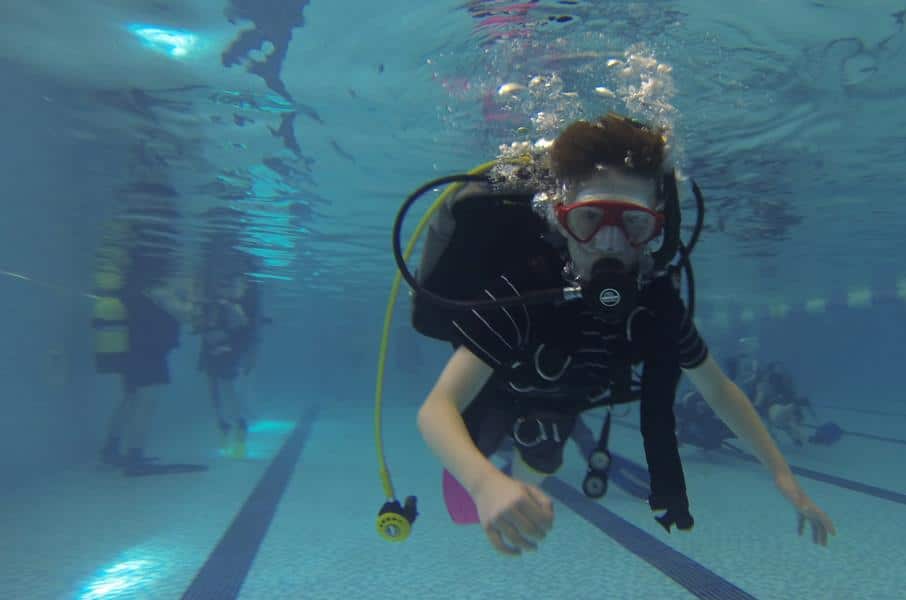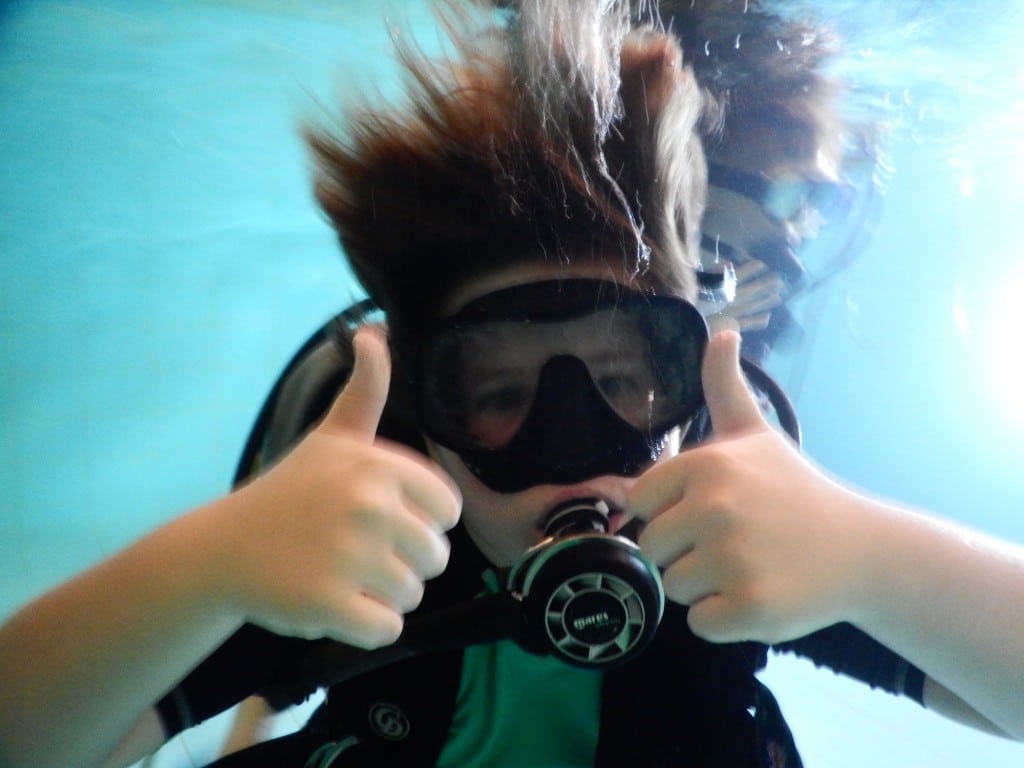Dive Training Blogs
Diving and Children: Are they ready?

In her first blog for Scubaverse, PADI MSDT and Dive School Operator Maryse Dare, shares some of her first-hand knowledge about teaching children to dive.
Incorporating a range of skills and experiences, Scuba Diving is an excellent activity for children. There are, however, different aspects to consider. In this blog we will be exploring some of the challenges to think through when a child starts on their diving journey.
The Assessment
Children develop at different rates. Although the youngest age for a Bubblemaker experience is 8, there are some children who may not be ready to start diving. At our dive school, we start children with a one to one session, and only book for one session, rather than encouraging parents to sign up for a full course. Children will be taken through a Bubblemaker and we can then start to assess how they respond to directions and how comfortable they are underwater. Only then can we start to make an honest evaluation of how long they will need to reach the Seal Team performance criteria.
What do you look for?
The children will range from being anxious to declaring they’re ready to dive the Titanic. Some will be happy to walk away from Mum and Dad, others may be a bit clingy. This is one sign to keep an eye on as there will have to be a separation when they are underwater. In one Bubblemaker a participant would not go underwater unless their Dad was with them. Although he still enjoyed the experience, we knew that he would need a lot more one to one time before he could dive and participate in the Seal Team programme independently.
Hints and Tips
Teaching children is a skill in itself and many Instructor courses will not prepare you for teaching with children specifically, but the skills are transferable. Think about the language that is used: short words, short sentences and key information only. I tend to talk a little bit and then give the bullet point information. For example, I’ll explain the BCD and finish with getting them to inflate as I say “in”, and deflate as I say “out”, using the hand signals at the same time. A nice gentle tone and lots of encouragement is always useful. Where children are excited, it keeps them calm; where children are a little nervous, then it can instill confidence.

Ratios are important. After assessing the children you will have an idea of how much support each diver will need. We have some children who have had to maintain a one to one for several months; we’ve had others who are ready to join the main group halfway through the first session.
Including the parents in their child’s progress is important. We have a range of children and it’s important that each diver is allowed to progress at their own rate. We focus on mastering the skills but as children’s attention span differs, we may progress to another skill once one has been completed a few times, but then return at later dates to ensure mastery. This has the added bonus of refreshing the skills for everyone.
Being honest at the start is also important. The parents who sign their child up for a Seal Team programme need to understand that (as with any course) you’re paying for tuition – not for a certification. We evolved the idea of a monthly club to get round this issue. Whilst parents are advised of average times to complete a course we also advise it can be longer, or indeed shorter. We have had children who have taken twelve sessions to complete the Seal Team before progressing to Master Seal Team; we have had others who have been able to complete their Aquamissions in three sessions and progress.
Integrating a bit of theory into each session is important too, although we’ll discuss this in a later blog. By learning slowly and gently, the children will acquire not only the knowledge required but also the understanding behind the theory. We cover only the basics in the first session but the debrief is just as important to reflect on what has been experienced in the sessions.
Introducing children to diving is a privilege and if done correctly, the children can continue their journey with you to develop their diving for many years ahead. Taking a bit of extra time at the start of their experience with diving, and ensuring it is tailored to the individual, will create great ambassadors for our community; naturally displaying good diving techniques and attitudes, as well as being genuinely committed to protecting the environment in which we dive.
You can follow Maryse and her Dive Club / School at www.oceandiver.co.uk and www.facebook.com/OceanDiver.co.uk.
Blogs
PADI Recognises EMEA Members with New Professional Development Excellence Award

PADI® (Professional Association of Diving Instructors®) has recently launched their new Professional Development Excellence Award in EMEA (Europe, Middle East and Africa), celebrating PADI Five Star Instructor Development Centers (IDC) that are championing creating more PADI Professionals, at all levels, during the previous calendar year.
“While becoming a PADI Five Star IDC Center is a prized accreditation amongst members, this exclusive rating comes with the responsibility of training the next generation of divers to become PADI Instructors,” explains Dave Murray, Managing Director for PADI EMEA.
“PADI’s commitment to a continuing education philosophy encourages divers to realise their dreams of a career as a PADI Pro, teaching others to do what they love – to scuba dive. This new recognition award distinguishes productive PADI Five Star IDC stores for the time and effort they dedicate to marketing and conducting the professional training needed to grow the scuba diving industry.”
PADI’s EMEA Professional Development Excellence Award recognises members for reaching specific milestones based on the number of PADI Pro certifications they issue annually. It also provides an extra layer of credentials in their “Pro Development Status” to potential Divemaster and IDC candidates, along with any other prospective Pro-level customers and prospective employees.
The first awards were distributed earlier this year, with 12 PADI Five Star IDC Centers receiving the Platinum Award. This means that they have issued a minimum of 100 PADI Professional certifications from Divemaster to IDC Staff Instructor, which include 30 Core Professional certifications and 70 Continuing Education Instructor level certifications.

The 2025 PADI EMEA Professional Development Excellence Award is already underway and renewed PADI EMEA Five Star IDC Dive Centers and Resorts are automatically eligible. Stores that reach the recognition levels during 2024 will receive their award in the first quarter of 2025.
For more information about the award and to see the full list of award recipients visit here.
About PADI
PADI® (Professional Association of Diving Instructors®) is the largest purpose-driven diving organization with a global network of 6,600 dive centers and resorts, 128,000 professional members, and more than 30 million certified divers to date. Committed to our blue planet, PADI makes the wonder of the underwater world accessible to all, empowering people around the world to experience, explore and take meaningful action, as Ocean TorchbearersTM, to protect the world beneath the surface. For over 50 years, PADI is undeniably The Way the World Learns to Dive®, setting the standard for the highest quality dive training, underwater safety and conservation initiatives while evolving the sport of diving into a passionate lifestyle. For divers by divers, PADI is obsessed with transforming lives and, with its global foundation, PADI AWARETM, creating positive ocean change. Seek Adventure. Save the Ocean.SM www.padi.com
Blogs
Two great programs to thrill and excite from RAID

RAID’s Performance Diver program is part of the training agency’s unique ‘tune-up’ options for divers at all levels, from basic to technical. Its appeal to newer divers who did not get all they wanted from their open water course (perhaps with a non-RAID dive centre) has always been strong. But it’s a winning option for someone who has been inactive for a while as well.
The skills taught in this course have been designed by some of the most respected dive professionals in the industry. They have condensed years of in-water experience into a great program that’s fuelled by great ideas and solid knowledge. Something useful in all sorts of conditions and all sorts of gear configurations. In short, a range of skills you will use on every dive: buoyancy, trim, situational awareness, gear selection and management, contingency planning… having fun and staying safe.
You can find out more about RAID’s Performance Diver program here.
And with the agency’s renewed focus in 2024 on breath-hold programs, July is a good time to read about the benefits of RAID’s range of Freediving courses.
Freediving is such an exhilarating and beautiful sport that allows you to connect with the underwater world in a unique way.
The thrill of diving deep down, holding your breath, and exploring the depths with just a single breath is truly an unforgettable experience.
It requires focus, control, and a deep respect for the ocean. The sense of freedom and tranquility you can find while freediving is unlike any other.
Have you ever tried freediving or are you interested in learning more about it? You do not have to be a scuba diver to start… not at all!
And if you are already a diver, RAID can help you discover a whole new way to look at a familiar world.
You can find out more about RAID’s Freediving courses here.
To find out more about RAID and the agency’s diver training programs, visit diveraid.com.
-

 Blogs2 months ago
Blogs2 months agoDiving With… Nico, Ocean Earth Travels, Indonesia
-

 News1 month ago
News1 month agoMurex Bangka Announce New Oceanfront Cottages & Beachfront Dining
-

 Blogs2 months ago
Blogs2 months agoA new idea in freediving from RAID
-

 Marine Life & Conservation1 month ago
Marine Life & Conservation1 month agoIceland issue millionaire whale hunter a licence to murder 128 vulnerable fin whales
-

 Marine Life & Conservation2 months ago
Marine Life & Conservation2 months agoThe Shark Trust Great Shark Snapshot is back
-

 News3 months ago
News3 months agoCharting New Waters; NovoScuba Goes Global with the Launch of their Revolutionary Dive Training Agency!
-

 Gear News1 month ago
Gear News1 month agoNew Suunto Ocean – a dive computer and GPS sports watch in one for adventures below and above the surface
-

 Marine Life & Conservation Blogs2 months ago
Marine Life & Conservation Blogs2 months agoBook Review: Plankton















